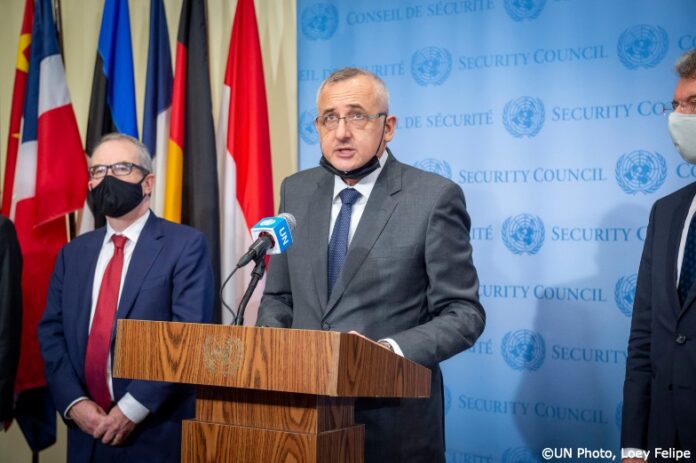When Belgium’s Minister of Foreign Affairs Sophie Wilmès was evaluating the country’s 2019-2020 mandate in the UN Security Council, she immediately announced it would run for a seventh term in 2037-2038.
What is behind Belgium’s commitment to multilateralism? What role does the country want to play, and how should it prepare for its future candidacy?
To answer these questions, UNRIC interviewed three Belgian diplomats; Axel Kenes, Director General of Multilateral Affairs and Globalisation; Bert Versmessen, United Nations Director and Philippe Kridelka, Permanent Representative of Belgium to the United Nations in New York.
They take us behind the scenes of the country’s 2019-2020 mandate which, according to Axel Kennes, “was mainly characterised by tensions, both between the five Permanent Members as well as between the United States and its close partners”. Looking ahead to Belgium’s 2037-2038 candidacy, they share their ideal vision for the Security Council and outline paths to “strengthen the role of the UN”.
What does this new candidacy say about Belgium’s commitment to multilateralism?
Bert Versmessen (BV): Multilateralism is often just a creed, but you have to actually contribute towards it. Belgium is doing so through its mandates and responsibilities. The Security Council is the most coveted and most visible mandate; it is the heart of the job.
Axel Kenes (AK): In the meantime, we will preside over part of the Conference on Disarmament this year and are running to rejoin the Human Rights Council in 2023-2025. Belgium does not just wake up once every 12 to 15 years when it is in the Security Council. We remain an engaged and permanent partner.
How has European cooperation manifested itself in the Security Council?

AK: European solidarity became clear with the Iranian nuclear dossier. Belgium and its partners managed to hold the same line in the face of heavy diplomatic pressure from the United States. Despite leaving the Iranian nuclear deal, the Americans believed they still had the right to reimpose sanctions on Iran based on that deal. We made it clear that we did not share their view.
BV: We were able to ensure unanimity on this particularly controversial issue. We are a modest player compared to the five Permanent Members (P5), but when you are on the Security Council, everyone has a vote and each vote is worth as much as that of a P5.
Philippe Kridelka (PK): Our delegation consistently referred to the positions of the European Union (EU) in its interventions or stated the positions of Mr. (Josep) Borrell (EU High Representative for Foreign Affairs) or the European Council. It is a way of involving Europe in the UN and demonstrates the EU’s driving role on those issues.
Which story stands out the most from the recent 2019-2020 mandate?

BV: On February 12, 2020, the King gave his speech during our Security Council presidency, a highlight for everyone involved! I remember vividly the rare image of the King of the Belgians seated behind the nameplate “President”.
PK: Twice a month, members of the Security Council have lunch with the Secretary-General, either in person or online during the COVID-19 period. The Secretary-General then choses two or three country situations on which we have a discussion. Those are exceptional moments. It is the only time we can freely exchange views with the Secretary-General in the presence of the Russians or the Chinese. I will call for this type of informal, small group lunch or coffee meeting to also be organised with Member States who do not sit on the Security Council.
What lessons from this term do you hope to apply in 2037-2038 if Belgium’s candidacy is successful?
PK: What Belgium is doing to encourage representatives from civil society to speak up.
AK: This type of collaboration sets us apart. Contact with Belgian citizens through NGOs is essential. Multilateralism is meaningless if Belgians are neither aware nor understand what we are doing.
Can you give an example of the impact that Security Council decisions have on everyday life?
AK: We managed to get recommendations adopted on 13 of the 14 problematic situations for children in armed conflict identified by the Secretary-General. We also enriched most of the Security Council’s resolutions with specific language on this topic.
PK: It is one of the issues that helped us demonstrate the importance of the Security Council to the Belgian people and parliament. It shows the UN at its best: motivated member states, engaged civil society and the formidable work of the Department of Special Representative of the Secretary-General Ms. (Virginia) Gamba conducting dialogues with UN teams on the ground.
What changes should the Security Council undergo by 2037?

BV: There is clearly a problem of representation affecting mainly, but not exclusively, the African continent. The Security Council should expand. Impatience is growing, but I do not see a revolutionary change happening by 2037. You could already create some small changes, such as restricting the right to veto. For example, when it concerns genocide and a veto is used, the case could automatically be referred to the General Assembly.
What will the ideal Security Council for Belgium look like in 2037?
AK: The Security Council must be able to deal with issues that fall within the broad sense of the concept of security. This means a form of security that takes into account respect for human rights, justice against impunity and the consequences of climate change.
PK: I hope that the increasing importance of international challenges such as terrorism, pandemics, climate, biodiversity or the environment will make all Member States aware of the need to transfer a little more of their national sovereignty to the multilateral system to strengthen the role of the United Nations.
Additional links:




